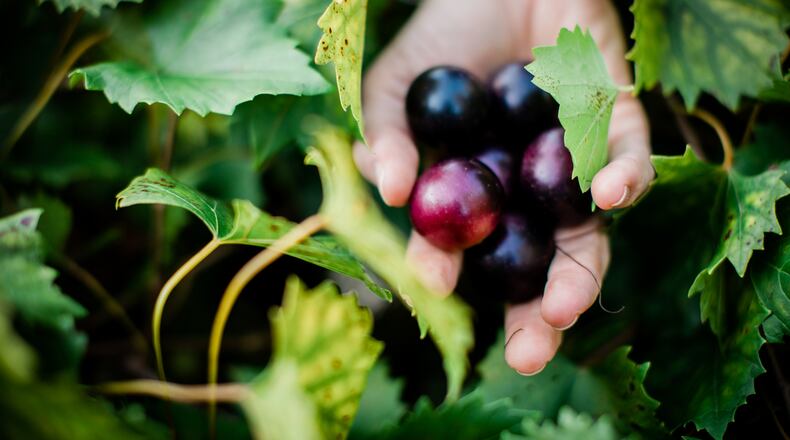Matthew Terrell was following the fruit map published by Concrete Jungle when he stumbled on some muscadines.
The purple ovoids were lying on the ground in a corner of the wooded Frazer Center property, in Lake Claire. Leaving the fallen fruit behind, Terrell looked for the vine, which was covered up by some invasive cherry laurel.
Like other Concrete Jungle members, Terrell helps gather unused fruit and vegetables growing in public spaces for charity organizations. The group publishes a map that shows the locations of 3,800 trees, vines and bushes producing fruit all over metro Atlanta, tasty food that’s just waiting for a hungry mouth.
But this vine was off the map. Terrell talked to Frazer CEO Paige McKay Kubik who invited him to collect what he wanted. She said recently she is interested in planting more vines at the center.
The muscadine, Vitis rotundifolia, is a hardy native plant, tolerant of the cold and heat, resistant to mold and less susceptible to disease than its finicky European cousin, Vitis vinifera.
The plant is hardy because it grew up in a tough neighborhood, says breeder Jeff Bloodworth. The Southeast, home to V. rotundifolia, features “lots of moisture, heat, humidity, fungi, bacteria — this is what the muscadine has adapted to,” said Bloodworth.
These qualities make the plant attractive to members of Concrete Jungle, whose harvesting depends on plants that don’t need a lot of attention.
Credit: Maria Lioy
Credit: Maria Lioy
It is almost harvesting time for the non-profit. Executive director Katherine Kennedy said in a few weeks teams will be out scouting for mulberries, then serviceberries. By June, plums will be ready to pick, followed by apples in July, muscadines and pears in August and persimmons in the fall.
Kennedy’s volunteers only gather from public property, or private property where the landowner has given permission. Their efforts have become more critical during the pandemic, when the elderly couldn’t leave their homes and food charities stepped up their deliveries.
Concrete Jungle pickers follow COVID-19 precautions, keeping groups small, requiring masks and frequent sanitation. They will continue to follow those guidelines this year.
To increase their yields, the group plans to expand the muscadine crop in Atlanta by handing out 100 young muscadine plants to members who will plant them in locales that are accessible to the public.
The plants were donated by Gardens Alive, an Ohio garden supply company that has underwritten Bloodworth’s breeding program.
Bloodworth has been working on developing what breeders call an “inside fruit.” Most muscadines have a thick skin, and large, bitter seeds. Regular eaters usually bite open the fruit, suck out the interior (described as having the texture of an eyeball), discard the skin and spit out the seeds. This technique doesn’t work well in grandma’s parlor.
Bloodworth has created two seedless varieties of the fruit (called RazzMatazz and Oh, My) with a thinner skin, but the same disease resistance. “He did what some people thought was impossible,” said Mark Wessel, director of horticultural research at Gardens Alive.
These are the varieties that Concrete Jungle’s volunteers will be planting. Terrell, communications director at Dad’s Garage Theatre, has plans to start a few vines along a sunny chain link fence on the theater’s property. Other members will be planting them in public locales, or in yards that are easily accessible from the street.
The vine can grow to six inches in diameter and up to 40 feet high if it isn’t pruned and trained. “My best recommendation is they do need to have a very solid trellis,” said Kennedy.
A chain link fence with good sun will work, but the robust muscadine can pull down lightly constructed wooden supports. Kennedy recommends using 4-by-4 inch uprights and sinking them in the ground to a substantial depth.
Any leftover baby muscadine vines can be planted at the group’s half-acre Doghead Farm in the Sylvan Hills area of southwest Atlanta. The tiny lot produces 5,000 pounds of beets, carrots, collards, cucumbers, eggplant, peppers, potatoes, radishes, summer squash, sweet potatoes, tomatoes, turnips and winter squash every year.
Kennedy is happy that the antique plant is enjoying a revival. “It’s cool to see such a traditional old southern grape being cultivated and being introduced to new generations,” she said.
Those interested in volunteering with Concrete Jungle should go to concrete-jungle.org.
About the Author
Keep Reading
The Latest
Featured





